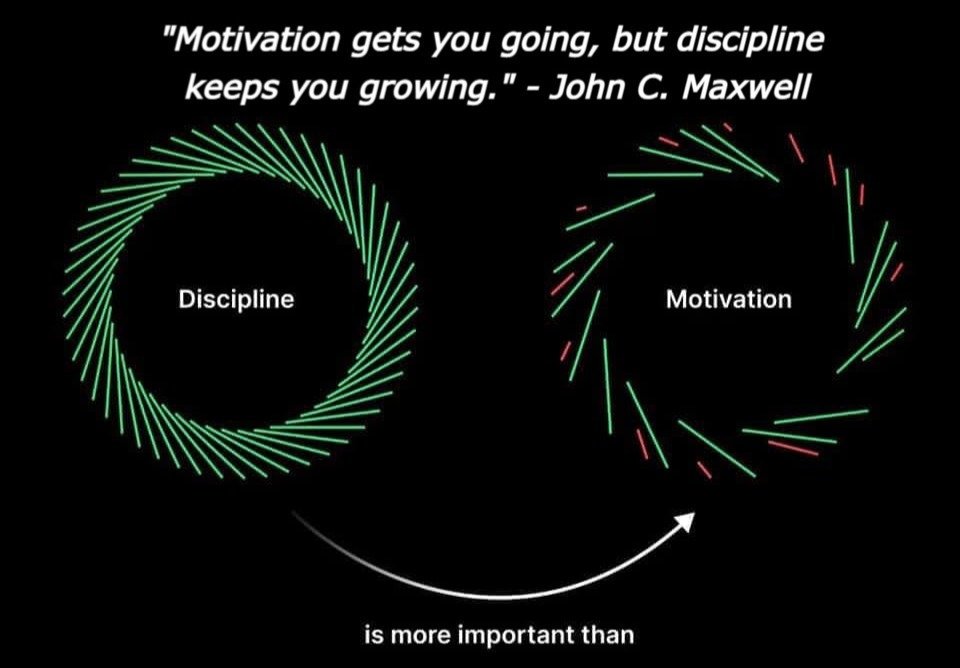Success is a journey that requires both motivation and discipline, but many people wonder which is more essential to achieving their goals. Motivation is often seen as the spark that gets you started, while discipline is the engine that keeps you going when motivation fades. In this post, we’ll explore the differences between the two, how they complement each other, and why both are important for long-term success.
1. What Is Motivation?
Motivation is the emotional drive that pushes you to take action. It’s that feeling of excitement or inspiration that makes you want to start a new project, pursue a goal, or take on a challenge. Motivation can be fueled by a variety of factors, including personal desires, external rewards, or even the influence of others.
While motivation is essential for getting started, it’s often short-lived. For example, you may feel highly motivated to exercise after watching a fitness video, but that feeling may disappear after a few days. This is why motivation alone is not enough to ensure long-term success.
2. What Is Discipline?
Discipline, on the other hand, is the ability to stick with your goals and actions regardless of how you feel. It’s the consistent commitment to follow through, even when motivation is lacking. Discipline is about creating habits and routines that align with your goals, allowing you to take action even when you don’t feel like it.
Discipline often requires mental toughness and the ability to resist distractions or temptations. For example, if your goal is to write a book, discipline is what keeps you writing each day, even on days when inspiration is nowhere to be found.
3. The Role of Motivation in Success
Motivation plays an important role in the initial stages of success. It provides the excitement and energy needed to get started on a new goal. Whether it’s starting a business, losing weight, or learning a new skill, motivation is often the driving force that pushes you to take that first step.
However, motivation can be inconsistent. It’s often tied to your emotions, which means it can fluctuate based on your mood, environment, or external circumstances. This is why relying solely on motivation can be risky—it’s not always reliable when you need it most.
4. The Importance of Discipline for Long-Term Success
Discipline is the cornerstone of long-term success. While motivation may help you start, discipline is what helps you stay on track. It ensures that you continue to take action, even when the initial excitement fades or obstacles arise.
One of the key benefits of discipline is that it builds habits. By consistently practicing discipline, you create automatic behaviors that support your goals. Over time, these habits make it easier to maintain progress without relying on bursts of motivation.
For example, if you’re trying to improve your fitness, discipline is what gets you to the gym on a regular basis, even when you don’t feel like it. Over time, this discipline creates a habit, making it easier to stick with your routine.
5. Motivation and Discipline: A Balanced Approach
While discipline may be more important for long-term success, motivation still plays a critical role. The key is to strike a balance between the two. Use motivation to get started and set exciting goals, but rely on discipline to keep moving forward, especially when challenges arise.
To achieve this balance, focus on creating a system that supports both motivation and discipline. For example, set short-term, achievable goals to keep your motivation high, while also developing daily habits that reinforce discipline. Celebrate small wins to maintain your enthusiasm, but also embrace the grind of consistent effort to reach your ultimate goal.
Conclusion: Discipline Wins in the Long Run
In the debate between motivation and discipline, discipline ultimately wins when it comes to long-term success. Motivation is essential for getting started, but it’s discipline that keeps you moving forward when times get tough. By combining both, you create a powerful formula for achieving your goals and reaching your full potential.

